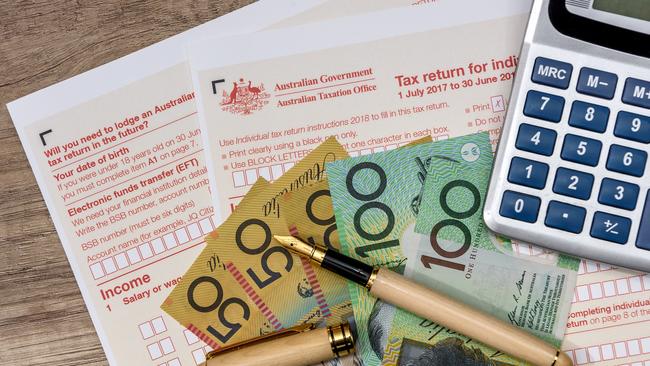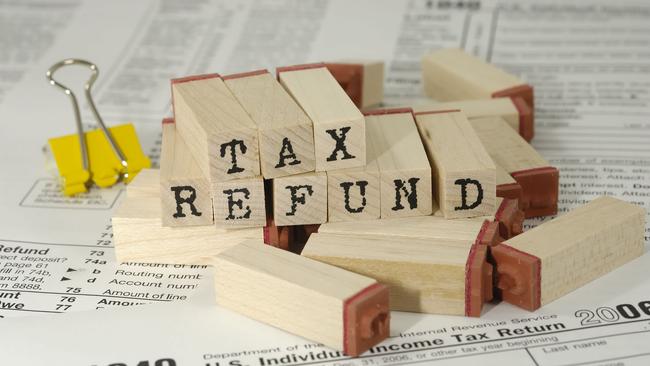Expert tips to avoid an Australian Tax Office audit
Mucking up your tax return can result in the Australian Tax Office asking you to pay more tax or even a hefty penalty. A tax expert has compiled this list of common causes for ATO audits exclusively for readers of The Daily Telegraph.
Business
Don't miss out on the headlines from Business. Followed categories will be added to My News.
Mucking up your tax return can result in the Australian Tax Office potentially asking you to pay more tax or even a hefty penalty. The most common mistakes are failing to declare income, claiming deductions you are not entitled to and if you are a business, having financial performance that is out of kilter with your industry.
H&R Block director of tax communications Mark Chapman has compiled this list of common causes for ATO audits exclusively for readers of The Daily Telegraph.

Failing to declare income:
If you run a retail business and don’t declare all your sales, expect the ATO to take an interest. The ATO is looking particularly closely at cash-only businesses.
Their perception is that in this day and age, the only reason for a business to be run on a cash-only basis is to avoid tax.
Even where the business isn’t cash only, the ATO will keep a close eye on your business margins to ensure that all sales are being properly recorded through the books.
Amongst the “tricks of the trade” which the ATO uses are the small business benchmarks, which group together the financial results of numerous businesses across a particular industry to produce a band of results which represent a typical business within that sector.
Businesses which fall outside the benchmark percentages for, by way of example, turnover or profit, will often find themselves being looked at more closely by the taxman.
This can be a controversial technique, with many business owners who have had to fight off the ATO complaining that the “one size fits all” approach exemplified by the benchmarks simply fails to take into account the unusual but very real factors (such as seasonal trade, demographics or even personal factors like relationship breakdowns) which can cause some businesses to perform differently to their peers.
In addition, the ATO now has access to multiple sources of external information which it uses to data-match against the figures which businesses themselves report. If they don’t match, the business can expect a visit from the tax man.
Amongst the data sources available to the Tax Office are transaction details from banks, share registries, employers, merchants, states and territories and government departments.
As an example of how this can be used, the ATO acquired data from coffee merchants detailing coffee purchases by coffee shops across Australia.
From that data, the ATO was able to extrapolate roughly how many cups of coffee each shop should have sold and – using average coffee prices – what the value of turnover would be for each shop. Comparing that to the actual turnover declared by each coffee outlet highlights those where there is the possibility of undeclared sales.
In addition to all of this, of course, the ATO is also highly dependent on good old fashioned community whistleblowers who complain about businesses failing to properly record sales.
The ATO has a particular focus this year on taxpayers failing to declare income from new sources such as:
•Buying and selling cryptocurrencies, such as Bitcoin
•Renting out your property through accommodation sharing sites like Airbnb
•Driving for ride-sourcing services like Uber
These are all relatively new, innovative ways to make money and the ATO believes that many taxpayers, either deliberately or accidentally, are failing to disclose profits made.

Claiming deductions you’re not entitled to:
We all know you’ve got to spend money to make money and if you spend it to produce ‘assessable’ income, then you will usually be entitled to a tax deduction. Many people trip up by inflating their deductions or claiming for something they shouldn’t but a surprising number also miss out on deductions they could have claimed. In reality there are legitimate, not-to-be-forgotten deductions that almost everyone can take advantage of.
The basic rule of course, to avoid the attention of the ATO, is that you need to show you are actually ‘out-of-pocket’, and that the expense has been incurred as part of your job or business. You also need to keep sufficient records to substantiate the expense.

Income out of line with lifestyle:
If you’re riding around in the latest Rolls Royce and enjoying harbourside living in one of the ritzier Sydney suburbs, but only declaring income of $10,000 on your tax return, the ATO will be looking very closely indeed at you.
The ATO is able to assess the assets you own – cars, properties, boats, etc – and calculate the approximate amount of income you would need to support your lifestyle. If the amount of income you’re actually declaring is significantly less, you’ll trigger alarm bells at the ATO.
As well as traditional sources of third part data like records of property purchases and sales, the ATO even scrutinises social media, so those Instagram pictures of you enjoying the high life in the Caribbean might not sit too comfortably if your declared income is less than the tax-free threshold!


